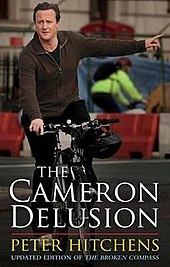The Broken Compass
[1] Hitchens concludes that, since the compass is broken, the time has come in British politics for the re-establishment of a proper adversarial system and for principles to be rediscovered.
The aim of this book is to defy these two enemies of thought and reason", and "conventional wisdom's biggest single mistake is its thought-free, obsolete idea of Left and Right".
[5] Hitchens claims in Chapter 4, "Fear of Finding Something Worse", that Labour has reached "the most significant moment in its history – the complete acceptance of its programme by the Conservatives".
[7] Chapter 5, "The Great Landslide", discusses how a number of left-leaning writers and newspapers have allegedly begun describing the Conservatives in favourable terms, and how this no longer constituted "a form of treason".
[8] Chapter 6, "Riding the Prague Tram", describes Hitchens's experience of travelling in Communist Bloc countries before the fall of the Soviet Union and how this, combined with the behaviour of certain left-wing organisations in the UK, led to his becoming disillusioned with the British Left.
He also carries out a lengthy critique of the Western Left's apologist stance towards Soviet Communism, including views held by Fabian Society members Beatrice and Maurice Webb; the attempt to exonerate and romanticise Lenin and Trotsky;[9] and intellectual resistance to the works of Alexander Solzhenitsyn and Robert Conquest.
Chapter 8, "Racism, Sexism and Homophobia", examines how the modern ideology of race and the term racist differ from the previous concept of "racialism", and how the sexual revolution represents "seeking the existing order's permission to pursue pleasure at all costs",[10] which undermines Christian principles of marriage, and has its roots in events in 1968.
Hitchens also quotes a 2000 study,[16] which asserted that "the general lowering of standards and rigour since the end of selection is one of the main reasons behind the current drive to devalue examinations".
[20] In Chapter 13, "A Comfortable Hotel on the Road to Damascus", Hitchens explores how since the 2001 September 11 attacks and the 2003 Invasion of Iraq, certain commentators on the left realigned with an American neoconservative position, which, "delivers him [the leftist commentator] to another portion of the 'centre ground', one where foreign policy is the only thing worth discussing, and where former conservatives and former Leftists can mingle in happy communion",[21] and allows "political conservatism to soothe its tribal base by appearing strong overseas, while failing to be anything of the kind at home".
He identifies the end of the Cold War (which "made many of the old political positions meaningless overnight"[23]) as one cause of this, as well as the implementation of the ideas of Fabian social democracy and the ideology of the 1960s.
So we have a permanent government of the centre and one of Labour's main aims is to stop a genuinely Conservative party emerging that may attract working-class votes on such issues as "immigration and disorder" and getting Britain out of Europe.
Steven Poole in his Guardian review wrote that "Hitchens should at least be applauded for taking the trouble to provide an amusing index, a duty shirked by too many authors."

